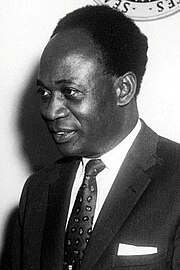
North Korea has diplomatic relations with 160 states. The country's foreign relations have been dominated by its conflict with South Korea and its historical ties to the Soviet Union. Both the government of North Korea and the government of South Korea claim to be the sole legitimate government of the whole of Korea. The de facto end of the Korean War left North Korea in a military confrontation with South Korea along the Korean Demilitarized Zone.

Juche, officially the Juche idea, is the state ideology of North Korea and the official ideology of the Workers' Party of Korea. North Korean sources attribute its conceptualization to Kim Il Sung, the country's founder and first leader. Juche was originally regarded as a variant of Marxism–Leninism until Kim Jong Il, Kim Il Sung's son and successor, declared it a distinct ideology in the 1970s. Kim Jong Il further developed Juche in the 1980s and 1990s by making ideological breaks from Marxism–Leninism and increasing the importance of his father's ideas.

Hungary–South Korea relations refer to bilateral relations between Hungary and South Korea. Hungary has an embassy in Seoul and an honorary consulate in Incheon. South Korea has an embassy in Budapest.

Kim Il Sung was a North Korean politician and the founder of North Korea, which he led as Supreme Leader from the country's establishment in 1948 until his death in 1994. Afterwards, he was succeeded by his son Kim Jong Il and was declared Eternal President.
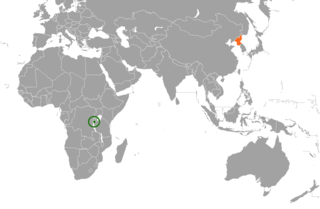
Burundi–North Korea relations refers to the current and historical relationship between Burundi and North Korea. Neither country maintains an embassy in their respective capitals.

Central African Republic–North Korea relations refers to the current and historical relationship between the Central African Republic and the North Korea (DPRK). Neither country maintains an embassy in their respective capitals.

Namibia–North Korea relations refers to the current and historical relationship between Namibia and the Democratic People's Republic of Korea (DPRK). Neither country maintains an embassy in their respective capitals, although DPRK formerly had one in Windhoek, which closed down in 1994.
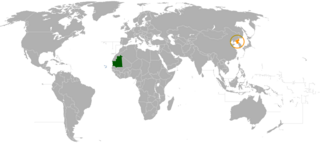
Mauritania–North Korea relations refers to the current and historical relationship between the Islamic Republic of Mauritania and the Democratic People's Republic of Korea (DPRK), commonly known as North Korea. Neither country maintains an embassy in their respective capitals.

Guinea-Bissau–North Korea relations refers to the current and historical relationship between Guinea-Bissau and the Democratic People's Republic of Korea (DPRK), commonly known as North Korea. Neither country maintains an embassy in their respective capitals.

The Gambia–North Korea relations refers to the current and historical relationship between the Gambia and the Democratic People's Republic of Korea (DPRK), known as North Korea in the Western World. Hong Son-phy is the accredited ambassador to Banjul.
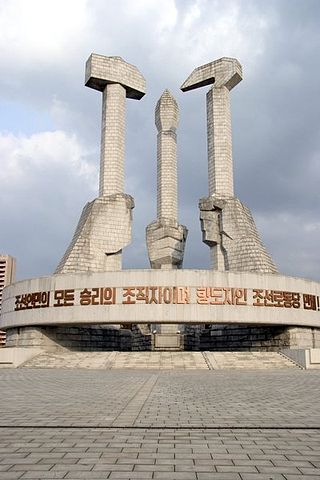
The Party Foundation Day is an annual public holiday in North Korea marking the 10 October 1945 foundation of the "Central Organizing Committee of the Communist Party of North Korea", known as the "North Korea Bureau of the Communist Party of Korea" in the West and considered a predecessor to the ruling Workers' Party of Korea.

The Socialist Women's Union of Korea is a mass organization for women in North Korea. Founded in 1945 as the North Korea Democratic Women's League, it is the oldest and one of the most important mass organizations in the country. The Union has committees on every level of administrative divisions of North Korea, from ri (village) all the way up to provinces.
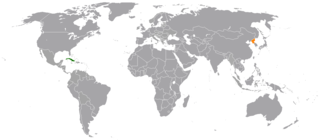
Cuba–North Korea relations are the bilateral relations between Cuba and North Korea.
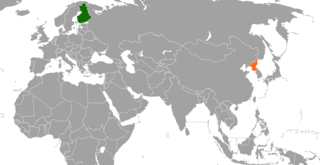
Finland–North Korea relations are bilateral relations between Finland and North Korea.

The nations of Mexico and the Democratic People's Republic of Korea established diplomatic relations in 1980. Both nations are members of the United Nations.
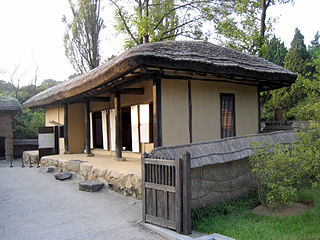
Revolutionary Sites (Korean: 혁명사적지) are designated historical sites in North Korea. The sites were designated by Kim Jong Il when he began working at the Propaganda and Agitation Department of the Workers' Party of Korea in 1966. He would send troops all over the country to unearth sites that "were supposedly once forgotten and undiscovered". By converting North Korea into a "huge open museum", Kim's goal in designating the sites was to solidify the North Korean cult of personality centered around him and his father Kim Il Sung.

Myanmar (Burma) and North Korea established bilateral diplomatic relations in May 1975. The history of contacts between the two countries goes back to 1948, the year of the declaration of Burmese independence. Initially, however, Burma under U Nu favored Syngman Rhee's government in the south of Korea. During and after the Korean War, Burma balanced the interest of North and South Korea, taking into consideration the position of China. After the 1975 establishment of diplomatic relations Burma began to shift toward North Korea, which was also nominally socialist and equally wary of Western imperialism.
Africa–North Korea relations refers to the diplomatic relations between the Democratic People's Republic of Korea and the continent of Africa. Many African nations maintain a close relationship with North Korea, despite United Nations sanctions on North Korea.


